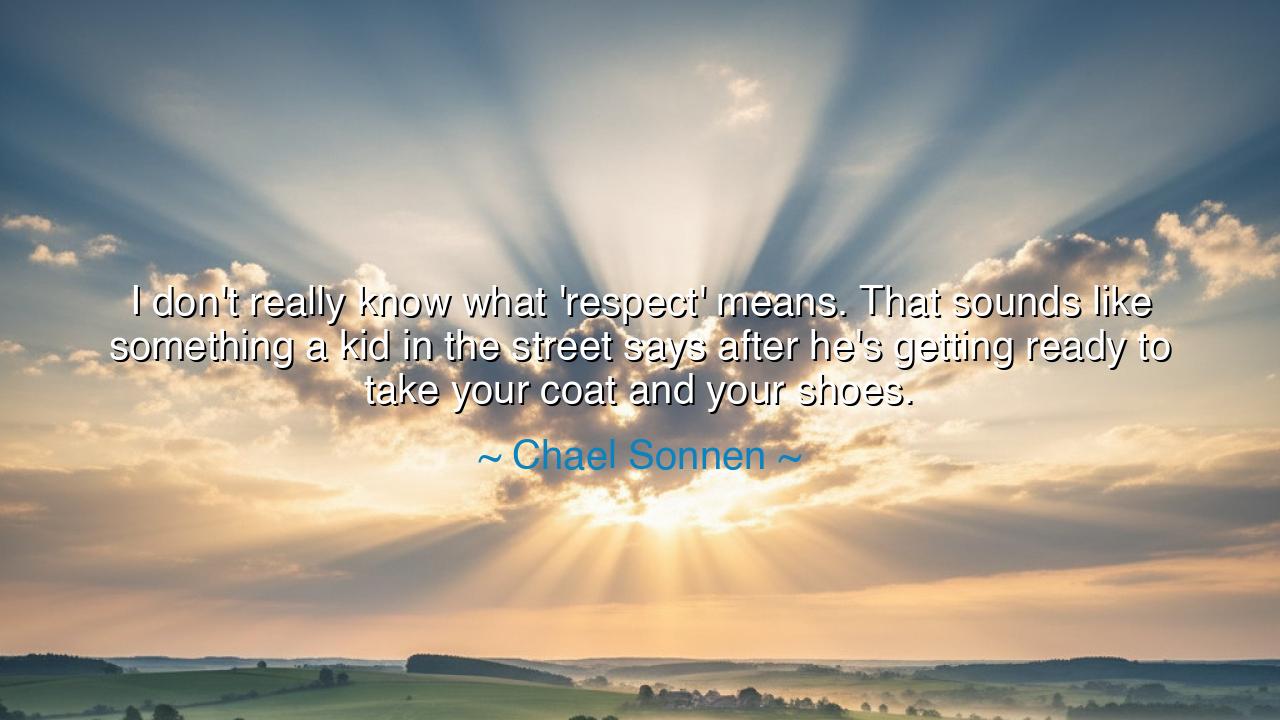
I don't really know what 'respect' means. That sounds like
I don't really know what 'respect' means. That sounds like something a kid in the street says after he's getting ready to take your coat and your shoes.






Hearken, O seekers of insight and disciples of the fighting spirit, to the words of Chael Sonnen, who declared: “I don’t really know what ‘respect’ means. That sounds like something a kid in the street says after he’s getting ready to take your coat and your shoes.” In this utterance, spoken by a warrior of the modern arena, lies a reflection not of arrogance, but of realism, irony, and the hard truth of survival. Sonnen, a fighter both with words and with fists, strips away the noble polish that society paints upon the word “respect,” revealing it as a weapon, a currency, and sometimes a mask for aggression.
In the world of combat, where strength, pride, and reputation are constantly tested, the idea of respect is not born of gentle admiration but forged through confrontation. Sonnen’s voice speaks from the battlefield of the body and the mind, where sentiment can be weakness and pretense can be fatal. His skepticism is not directed at virtue itself, but at the hypocrisy with which people wield it. When he says he doesn’t “know what respect means,” he unmasks the illusion of moral politeness—the hollow promises and false gestures often made in the name of honor, even as one prepares to dominate or destroy another.
In the ancient world, the warriors of Sparta, too, cared little for the flowery language of civility. To them, respect was not given through words but through action, courage, and endurance. The man who survived the battlefield and stood firm in pain earned recognition without speaking it. Likewise, Sonnen’s words echo this older, rawer philosophy: that true respect cannot be claimed—it must be proven. When he mocks the idea of “respect” as a prelude to theft or deceit, he reminds us that in the ruthless struggle of competition, respect is often the vocabulary of manipulation.
Consider the story of Achilles, the mightiest of the Greeks. He demanded respect from kings and comrades alike, yet what he sought was not admiration but acknowledgment of his power. When he felt dishonored by Agamemnon, he withdrew from battle, and Greece nearly fell. His pride was his virtue and his downfall. Through Achilles, we see that respect, when bound to ego, becomes poison—a trap for those who crave validation from others rather than finding it within themselves. Sonnen’s modern reflection carries this same ancient wisdom: to rely on respect is to give others power over your worth.
Yet there is a subtler truth here. Sonnen’s dismissal of “respect” hides a deeper philosophy: self-reliance. He does not reject honor—he redefines it. He implies that in the harsh theater of life, one must not seek to be respected, but to be unshakable. The man who depends on respect is fragile; the one who forges his own value cannot be diminished by words, praise, or insult. Just as the Stoic philosopher Epictetus taught that external approval is fleeting and meaningless, Sonnen speaks in his own tongue the same eternal truth: strength lies in self-definition, not social validation.
The lesson is profound: respect is not what others give you, but what you demonstrate through your resilience, your deeds, and your mastery. The world may flatter or despise you; neither determines your worth. Do not chase respect as though it were treasure—it is a reflection that fades when the light of admiration moves elsewhere. Instead, cultivate authenticity, skill, and courage, and respect will follow as a shadow follows the body.
Practical action flows from this wisdom. Speak less of respect; show more of character. Seek not to be praised, but to be formidable, disciplined, and true to your craft. Whether in battle, art, or daily life, let your strength make others take notice, not your demand for recognition. In this way, you will live as the ancients lived—not chasing honor, but embodying it.
O seeker of understanding, remember this: Chael Sonnen’s words are not cynicism, but armor. He strips the world of pretense to reveal a truth as old as war itself—that respect without substance is wind, and admiration without integrity is dust. Walk the path of mastery, and let your deeds speak for you; for the one who no longer needs respect has already earned it.






AAdministratorAdministrator
Welcome, honored guests. Please leave a comment, we will respond soon